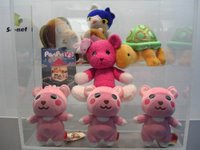
AP Wire 06/14/2006 Love for cute has Japan soul-searching:
Love for cute has Japan soul-searching
YURI KAGEYAMA
Associated Press
TOKYO - Cute is cool in Japan. Look anywhere and everywhere: Cartoon figures dangle from cell phones, waitresses bow in frilly maid outfits, cherries and bows adorn bags, even police departments boast cuddly mascots.
These days, Japan Inc., known in the past for more serious products like Toyota cars and the Sony Walkman, is busy exporting the epitome of cute - bubble-headed Hello Kitty, Pokemon video games, the Tamagotchi virtual pet, just to name a few.
But the prevalent obsession with things cute has the world's second biggest economy engaging in some serious soul-searching lately, wondering what exactly is making its people gravitate so frantically toward cuteness. A big reason for the emerging debate: Cute-worship is gaining such overseas acceptance it's rapidly becoming Japan's global image.
"Cute is a boom. This style has suddenly become a fashion element among youths around the world," said Shuri Fukunaga, managing director at Burson-Marsteller in Japan, who advises global companies about communication and marketing. "Marketers in Japan are seeing this and are adept at churning out products that incorporate this style for overseas."
Nintendo Co., which makes Super Mario and Pokemon video games, recorded $3.1 billion in U.S. and European sales in fiscal 2005. The entertainment content business in Japan totals some $116 billion, the equivalent of about two-thirds of Toyota's sales, according to the Digital Content Association of Japan.
Skeptics here say Japan's pursuit of cute is a sign of an infantile mentality and worry that Japanese culture - historically praised for exquisite understatement as sparse rock gardens and ukiyoe woodblock prints - may be headed toward doom.
Osaka Shoin Women's University professor Hiroto Murasawa, an expert on the culture of beauty, believes cute is merely proof that Japanese simply don't want to grow up but feels they must change to articulate its views on the international stage.
"It's a mentality that breeds non-assertion," he said of the cute mind-set. "Individuals who choose to stand out get beaten down."
On the other side of the argument stands Tomoyuki Sugiyama, author of "Cool Japan," who believes cute is rooted in Japan's harmony-loving culture.
Collecting miniatures such as mementos for cell phones can be traced back 400 years to the Edo Period, when tiny carved "netsuke" charms were wildly popular, said Sugiyama, president of Digital Hollywood, a Tokyo school for computer-graphics designers, video artists and game creators.
"Japanese are seeking a spiritual peace and an escape from brutal reality through cute things," he said.
Model-cum-actress Yuri Ebihara, 26, widely viewed here as the personification of cute, commands such influence the clothes she sports in a fashion magazine, such as lacy pastel skirts, are instant sellouts.
"I make it a point never to forget to smile," said Ebihara, often seen in TV ads and on billboards. "If someone doesn't find me cute, I want to know why because then I'll work on it to get better at being cute."
Yutaka Onishi, editor in chief of CanCam, the 650,000-circulation magazine that propelled Ebihara to stardom, says the petite, girl-next-door Ebihara, is pioneering a look that's distinct from the tall sexy beauties of the West.
"Cute is that exclamation from the soul of Japan's younger generation," much like "soul" or "La Raza," Onishi said.
Ryoko Sato, a Japanese artist, shrugs off much of pop culture as empty fluff and seeks to delve deeper through works like "The Kiss." The photo of a skinned mouse next to its furry hide is a statement on how cute is as skin-deep as cruelty or ugliness.
"To me, cute always in my work couples with the grotesque," she said. "There's always a dark side to it."
Still, such naysayers are a minority.
"Japanese women see value in youth and want to combine childishness and cuteness with sexiness and glamour," says Sakae Nonomura, a researcher with the cosmetics company Kanebo. "Cute has now grown so widespread that various types of cute coexist."
Indeed, Japanese have come up with nuances of cute such as "erotic-cute" and "grotesque-cute," and use such phrases in everyday conversations.
Thirty-eight-year-old garbage collector Hideki Kojima is such a believer in cute he patronizes a "maid cafe," one of several that have sprung up in Tokyo, where waitresses don maid outfits and greet customers by squeaking: "Welcome home, master."
Sometimes Kojima goes three times a day to the cafe, which serves food and allows customers to take photos and play games with the maids, drops as much as $90 a visit for a chance to gawk at the maids.
"They're cute," Kojima says with conviction. "It can't really be explained in words."
Nobuyoshi Kurita, sociology professor at Musashi University in Tokyo, says cute is a "magic term" that encompasses everything that's acceptable and desirable - this nation's answer to the West.
Kurita thinks it's important to watch Japan's youngsters, who see the bustling streets of downtown Tokyo - where the cute aesthetic is born - as the center of their universe.
"Where cute goes determines the future of Japan," he said, adding that Japan's cute offerings may one day command the respect of luxury goods from Europe. "If it succeeds, Japan's future will be bright. If it doesn't, then Japan may disappear."
No comments:
Post a Comment